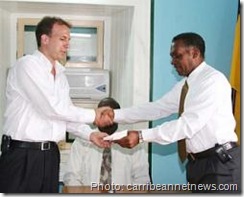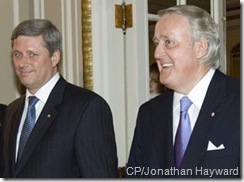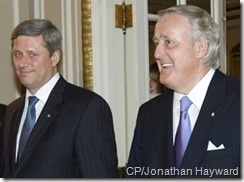Brian Peckford irritates some cabinet ministers.
"I really think that we've really dropped the ball on the whole fishery issue in Newfoundland. I really, really do," he said in a recent interview.
"I think we have not, as a province, argued relentlessly and weekly pursued a fisheries strategy which would allow us to have ... an Atlantic Accord on the fishery.
"Because what we did on the Atlantic Accord was we put the jurisdiction away, even though we lost in court. We got it back through the back door."
Peckford's crime is voicing an opinion, according to finance minister Tom Marshall and Kevin O'Brien, the fellow heading up the oxymoronicaly-named department of government services. The two ministers called VOCM's morning talk show to express their disapproval of the fellow who, as both took pains to note, doesn't live here any more.
Said Marshall: "Well that's exactly, and, you know, to live out there [in British Columbia] and then come in here and tell us we're doing it all wrong is a bit much."
Oh deary.
A bit much for a fellow who served as premier through a very difficult decade to dare offer an observation not merely on the performance of one administration but of the lot of us and the crowds we've elected.
Go read Peckford's comments, linked above, and then read Marshall's observations, transcribed in their entirety below.
"We seem to have one mindset when it relates to the offshore and a ... less-than-stringent approach to all the other areas - even those that are under our jurisdiction."
Peckford is hardly telling tales from school. One need hardly look very hard to see this double-standard applied. No subsidies for the oil industry - supposedly - and a heaping of something called 'equity' for the provincial government. By contrast, the forest industry gets at least $30 million in subsidies of one kind or another and when a mill closes and another shuts down a machine, the whole affair warrants scarcely a whimper from the most combative premier since...well...Brian Peckford, compared to the unholy tirade unleashed on oil companies.
Over in the fishery, meanwhile, the current provincial government enthusiastically facilitates the destruction of the only vertically integrated, internationally competitive company in the lot. Somewhere in there, the bits and pieces are sold off to a consortium that includes Icelanders, another lot is sold back to the Brits and the Nova Scotians walk off with the marketing arm and brands it took years to build.
All of these are resources, as most scarcely need reminding and yet oil is treated as some sort of sacred possession by the current administration. The fishery and forestry? Not really quite as sacred.
For his part, Tom Marshall tried to argue against Peckford on other matters. Marshall failed, of course, since most of what he said was utter nonsense. Like the bit about offshore revenues, the stuff which apparently the provincial government wasn't as fixated on as Peckford suggested:
You know, I really don't know. I mean there was, there's been two stories here. One came out of the, one was in The Telegram, I think, on the weekend. It talked about, you know, the Atlantic Accord and how everything is flowed out of the Atlantic Accord. And the Atlantic Accord that was negotiated back then was certainly an important document. I mean it did, it did share the management. Even though the federal government was determined by the courts to have jurisdiction over offshore oil and gas, it said that Newfoundland would be, Newfoundland and Labrador would be the principal beneficiary. But it wasn't working. It wasn't working as it was. We weren't seeing the benefits because we were losing them under the equalization formula. Whatever we were getting on the oil and gas we were losing under the equalization formula. So what Premier Williams did in '05 in the Atlantic Accord in '05, I mean that was the key document that made the difference because what he accomplished was that for every dollar we were losing on the oil and gas we got an offset payment from the Department of Natural Resources in Ottawa. We got this offset payment that made us whole. And as a result of what Premier Williams did in '05, the Atlantic Accord '05, you know, this year we're showing 305 million, which is allowing us to forecast a surplus of 261 billion, I'm sorry, 261 million and to p ay down some debt and that's what's made the difference. I mean Premier Williams has made the real difference here because we weren't getting rich before under the first part of the Atlantic Accord, but that's not to say that it wasn't, you know, a great document.
Under the 1985 Atlantic Accord, Tom Marshall and his colleagues get to set provincial government revenues from the offshore and collect every nickel of them. They keep every nickel of them as well. $16 billion worth of nickels from Hebron alone, as Marshall's colleague has claimed, and not a single one of those nickels, nor the pennies either, has ever been taken by any other government.
Not a one.
Anyone who claims otherwise is telling fibs.
The 2005 deal delivered the princely sum of $2.0 billion in a cash advance. The deal expires when the province ceases to qualify for Equalization and, as regular readers of Bond Papers will know, the advance will not be drawn down completely when the deal expires.
The entire basis of the provincial government's current fumbling in the oil industry comes from powers contained not in the 2005 deal but in the 1985 Atlantic Accord. When the 2005 deal is a moldering memory, the 1985 agreement will continue to deliver, as it has delivered since it was signed.
All that Brian Peckford has done in a series of interviews with local media is offer his views - based on experience - on issues related to resource management. He has a right to speak his mind and only the most churlish of churls would question his inherent right in a democracy to speak.
But Peckford is no ordinary voice. His voice drips of the experience of hard knocks and whether or not one supported him at the time or agrees with him now, he has every right to speak his mind. he earned the right and he should be heeded. One must not slavishly accept his every syllable, as some - like Marshall and O'Brien - must do for their master, but there are other legitimate perspectives than the one currently typed out as talking points from the Eighth Floor's blackberries.
It would be a mistake, however, to think that Marshall and O'Brien are hurling missiles at Peckford merely for speaking out or merely at their master's behest. What Peckford has hit on, with respect to the fishery, for example, is a deep-seated problem within local politics. While politicians have known for some time what must be done in the fishery, it is very difficult to get them to act. There is no stomach in the current administration as there has been no stomach in many administrations for taking the necessary measures to turn the fishery into an economically and environmentally sustainable part of the local economy.
It hurts to have that pointed out, apparently.
Otherwise Marshall and O'Brien would not have received their blackberry marching orders and thus ordered, skinnered themselves on to the open line shows to offer a rinky dink attack on a fellow most Progressive Conservatives in the province should be venerating. [Perhaps they do and that bothers some of the current crowd, too. But that is another story.]
Every thinking person in the province would do well to consider Peckford's advice.
It is the voice of experience and, as we should all know by now, experience counts.
Talking points thumbed out of someone's blackberry - likely from a junket to Rio - don't.
-srbp-
RANDY SIMMS: We are going to go now and say a very good morning here to the Finance Minister and Chairmen, President of the Treasury Board, Tom Marshall. Good morning.
TOM MARSHALL: Good morning Randy.
RANDY SIMMS: How are you doing?
TOM MARSHALL: I'm not too bad. I'm here in Corner Brook and I was just reading The Western Star today and I say former Premier's, Brian Peckford's remarks.
RANDY SIMMS: And your hair stood on end.
TOM MARSHALL: Well, what's left of it did. The, you know, the comment I read, I mean it's mainly about the fishery and I'll leave my colleague, Tom Rideout, and those with more, know more about the fisheries that I certainly do to comment on that aspect of it, but my difficulty is with the comments that, where Peckford said it's a mistake for the province to focus its efforts on the blossoming offshore oil and gas industry at the expense of everything else. And he goes on to say that we, I don't know who he's referring to as we, seem to have a one mindset when it relates to the offshore and a less astringent approach to all the other areas, even those that are under our own jurisdiction. Now, Randy, you know, every time I've been on your show and your colleagues' shows, and I've been going around the province given these, you know, talking about the budget and the main point, you know, the one thing that we're doing as a government is clearly set out in the budget and it's set out in the speech from the throne, and that's a recognition that the non-renewable resources are going to be gone day, that they're finite. One day they're going to be gone and that we've got to take advantage of this window of opportunity to transition our economy into a more diversified economy that, you know, that relies on our renewable resources. The whole energy plan talks about, you know, taking advantage of the non- renewable energy resources we have now to make sure that we have renewable energy resources for the future. And for someone to come in and say that we're only focused on the offshore, clearly has no understanding of what this government has been doing and what the very essence of this government is.
RANDY SIMMS: But, really, there is an impression out there, Minister. You know, as I said to your colleague, Mr. O'Brien, earlier today, there is an impression out there, right or wrong, and it could be equally wrong as it is right, that this government does not focus, I'm going to call it, on the older more stayed industrial realities in the province. We seem to be caught up in the sexiness of oil and gas. Now, and that impression, I think, is out there in the market, isn't it?
TOM MARSHALL: Well, you know, if you're going to say that, I mean I don't know what, you know, what the media focuses on. You know, they don't focus on everything that government does, but I mean the whole reality of our budget and our speeches from the throne and the, you know, the thrust of what this government is doing is recognizing that, look, we've only got a window here and we have to diversify our economy because those non-renewable resources are going to be gone. So we've talked about, number one, we got to pay down the debt. Now previous governments left, you know, the people of this province today saddled with a massive debt of over, almost, just under $12 billion. So we have to take advantage of the surpluses that we have to try to address that while we can. We're also lowering taxes to try to make the province more competitive. I mean to attract investment, to attract people that are going to create jobs, you have to have a competitive tax structure and we did that in the last budget. We're also focusing on not only investments in our traditional industries like the forestry, and we pumped a lot of money into forestry, you know that, there's over $30 million went to aid the forestry industry in this province, investments in aquaculture on the south coast, but we're also focusing on the knowledge economy. We're making major investments now in research and development.
RANDY SIMMS: Ok, so why do you think with all of this going on and he being aware of this as, he being Brian Peckford , being as aware of this as anybody, why would Brian Peckford at this point in his life and the life of this province and government want to come out and be this critical?
TOM MARSHALL: That you'll, I have no idea. You'll have to ask him that.
RANDY SIMMS: Well speculate. Why do you think?
TOM MARSHALL: You know, I really don't know. I mean there was, there's been two stories here. One came out of the, one was in The Telegram, I think, on the weekend. It talked about, you know, the Atlantic Accord and how everything is flowed out of the Atlantic Accord. And the Atlantic Accord that was negotiated back then was certainly an important document. I mean it did, it did share the management. Even though the federal government was determined by the courts to have jurisdiction over offshore oil and gas, it said that Newfoundland would be, Newfoundland and Labrador would be the principal beneficiary. But it wasn't working. It wasn't working as it was. We weren't seeing the benefits because we were losing them under the equalization formula. Whatever we were getting on the oil and gas we were losing under the equalization formula. So what Premier Williams did in '05 in the Atlantic Accord in '05, I mean that was the key document that made the difference because what he accomplished was that for every dollar we were losing on the oil and gas we got an offset payment from the Department of Natural Resources in Ottawa. We got this offset payment that made us whole. And as a result of what Premier Williams did in '05, the Atlantic Accord '05, you know, this year we're showing 305 million, which is allowing us to forecast a surplus of 261 billion, I'm sorry, 261 million and to p ay down some debt and that's what's made the difference. I mean Premier Williams has made the real difference here because we weren't getting rich before under the first part of the Atlantic Accord, but that's not to say that it wasn't, you know, a great document.
RANDY SIMMS: What, it's the basis on which everything else flowed, but, you know, is it, I'm going to speculate a little bit here, is it possible that Brian Peckford is throwing a little criticism at the provincial government because of his recent appointment by the feds?
TOM MARSHALL: Look, it could be, but Newfoundland and Labrador is making tremendous headway under the Newfoundland government and to say we're only focused on oil and gas, well now that it's not going to be there forever and that's why we're doing the things that we're doing under the Premier's leadership.
RANDY SIMMS: But you. . .
TOM MARSHALL: And for him to say that we're focusing exclusively on oil and gas would be the same as saying that when he was office he focused exclusively on growing cucumbers, and we all know that's not true. But it's an asinine comment to make and he has to be held to account for it.
RANDY SIMMS: And so, obviously, you're critical of it. I guess all members of the government are critical of it because, like I said, I heard from your colleague, Kevin O'Brien, already this morning on this matter. You know, but again, as I say to you, and I think it's, you know, it might be an unfair comment, I accept, but, nonetheless, there's truth in the feeling, in the statement that there's a feeling in the community at large that this is a government preoccupied with oil and gas and not spending enough time and effort on traditional industries like fishery. I think that that's a feeling in the community. It might be totally unfair though, Minister, I accept that it might be an unfair feeling.
TOM MARSHALL: I strongly. . .
RANDY SIMMS: And I know you're going to argue that point.
TOM MARSHALL: I would strongly disagree with that.
RANDY SIMMS: Yeah, but I don't know whether Peckford, you know, who is Peckford sitting in Vancouver these days to tell us one way or the other what it is?
TOM MARSHALL: Well that's exactly, and, you know, to live out there and then come in here and tell us we're doing it all wrong is a bit much. And now in fairness to him, you know, I mean sometimes there's a quote in the paper and maybe that's not what he said, but based on what he said as quoted I talk umbrage of the comment and I think he's wrong. And, you know, not focusing on the fishery, I mean I come from a district where the fishery is not a major industry, as you know, and , you know, I can tell you that from the time that I spend at the Cabinet table, I mean fishery dominates the discussion at our Cabinet table and there's no doubt or question about that. The forestry is taking up a lot of our time.
RANDY SIMMS: Well, you know. . .
TOM MARSHALL: But also more importantly, which we're focusing new areas, we're trying to take advantage of, you know, research and development and things we did in aquaculture on the south coast, you know, things that we're doing here in Corner Brook with the Centre of Environmental Excellence, with the new position, I mean open up the paper and you see the new positions going here into Corner Brook in R & D under the, you know, Institute of Biodiversity and the Centre of Environmental Excellence. There's about five or six new positions here and these are jobs based on the knowledge economy, not based on the old natural resource economy.
RANDY SIMMS: Ok, let me ask you this while I got you. All right, I know that there's a financial report coming down, what, at the end of this week?
TOM MARSHALL: Well it, you know, the Premier will be back and the report, I'll discuss it with my Cabinet colleagues and then they'll, will determine whether it's going to, when we come out publicly and announce it. RANDY SIMMS: I understood that it was going to happen this week.
TOM MARSHALL: Well, you know, I've learned in government that when I'm told it's going to happen on a certain day I don't believe it until I'm out there actually saying, ok.
RANDY SIMMS: Ok, 261 million, you're low balling it, aren't you?
TOM MARSHALL: Well I certainly didn't low ball it. I, you know, I said, you know, you always hear the criticism of governments because they go out with these low numbers and then when the numbers actually come out they say, oh, look, we did so much better. I didn't want to do that. I want to try to be as accurate as we can. But it's extremely difficult, of course, because, you know, the oil prices jump all over the place and I mean who would have thought that oil prices have gone, would go to where they've gone today. You know, we rely on Pure Energy Corporation out of New York. They're very highly regarded and very respected and they told us the average would be, you know, when we were doing our budget, they told us the average price for the year would be about $58.60. Now we get quarterly updates for them. We also get two custom reports a year from them and, of course, their suggestions are going up, but at the time we did the budget that's what they told us. Also, production numbers we don't control and also who knew that that dollar was going to go the way it is because every time the dollar goes up a cent our revenues are negatively impacted. But it certainly doesn't offset the benefits because of the higher oil prices.
RANDY SIMMS: You, as Minister of Finance, do you want to see, and I know the central bank is looking at taking a run at the dollar to try and bring it down to a more reasonable level, which would mean a drop in interests rates, are you taking a look at that? Are you chairing them on and do you want to see that happen?
TOM MARSHALL: Well, you know, quite frankly, I mean monetary policy is left to the Bank of Canada and, you know, they don't consult with me. They're an independent organization that determines monetary policy.
RANDY SIMMS: I know, but on the outside looking in thinking that every, that every penny, that every buck is another, you know, few million.
TO M MARSHALL: Yeah, but it works the other way. . .
RANDY SIMMS: It works the other way for us as well, every penny up costs. . .
TOM MARSHALL: Yeah, but I mean I do have major concern for the manufacturing sector, you know, especially the forestry sector here in this province. I mean in Ontario they've lost, what, 150,000 jobs.
RANDY SIMMS: I guess that's where I'm trying to go, Minister. I'm trying to get inside your head here a little bit to say, you know, all of this issue about fisheries and about forestry and about all of these other concentrations, the reality of it is we need a lower dollar to do that and that's going to have to some degree, is it not, at the expense of oil and gas revenues?
TOM MARSHALL: Yes it, yes, you know, I mean I would certainly a dollar that is fixed or pegged in relation to the US dollar to try to keep our dollar lower than the US dollar because of the fact that we are an economy that relies heavily on our exports. But that's something that, you know, that the Cabinet would have to deal with all together. I'm expressing my own view here.
RANDY SIMMS: Sure, sure, absolutely, absolutely. Well, Minister, thank you for this, this morning.
TOM MARSHALL: Randy, thank you. Good talking to you.
RANDY SIMMS: Good to talk with you again, as always.
TOM MARSHALL: Thank you. Bye.
RANDY SIMMS: Take care. Bye, bye. Minister Tom Marshall; he's Minister of Finance, he's President of Treasury Board and he's not that happy with former Premier Brian Peckford over his comments on the weekend and in the paper today.







